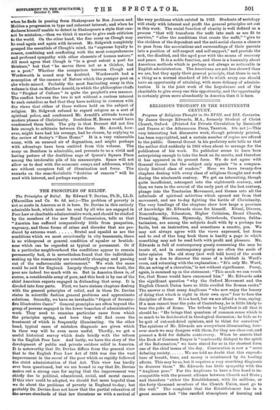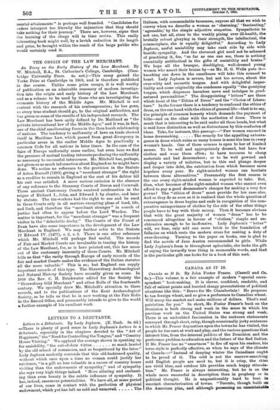the very problems which existed in 1832. Students of sociology
will study with interest and profit the general principles sot out in this work. The social function of charity is well defined as a process "that will transform the unfit into such as are fit to survive," "alter the conditions that create the unfit," "give to the children of the dependent and the anti-social classes a chance to pass from the associations and surroundings of their parents into a position of self-respect and self-support," and provide the sick, the disabled, and the aged poor with the means of recovery and peace. It is a noble function, and there is a humanity about American methods which is perhaps not always so noticeable in English administration. The Americans are not less shrewd than we are, but they apply their general principle, that there is such a thing as a normal standard of life to which every one should have an opportunity of attaining, with more delicacy of adminis- tration It is the joint work of the Legislature and of the charitable to give every one this opportunity, and the opportunity is certainly given more abundantly in America than it is here.
RELIGIOUS THOUGHT IN THE NINETEENTH CENTURY.
Progress of Religious Thought in the XVIII. and XIX. Centuries. By James George Edwards, M.A., formerly Student of Christ Church, Oxford. (Printed for Private Circulation by Barnicott and Pearce at the Athenaeum Press, Taunton. 10s. net )—This very interesting but discursive work, though privately printed, has been copyrighted, and a certain number of copies are offered to the public. General Gosset in his prefatory note tells us that the author died suddenly in 1903 when about to arrange for the publication of his work. No publisher seems to have been enterprising enough to take the book on its merits, and therefore it has appeared in its present form. We do not agree with General Gosset that the subject only appeals "to a compara- tively limited class of readers." Here we have twenty-five chapters dealing with every class of religious thought and work during the nineteenth century. We get an interesting, though quite insufficient, retrospect into the eighteenth century, and then we turn to the revival of the early part of the last century, plunge into the Tractarian Movement, and thence into all the infinitude of spiritual activities which opened out from that movement, and are to-day fighting the battle of Christianity. The very headings of the chapters show how large a province of knowledge Mr. Edwards chose for himself. Ritual, Divorce, Nonconformity, Education, Higher Criticism, Broad Church, Preaching, Missions, Hymnody, Sisterhoods, Curates, Sabba- tarianism, are among the subjects dealt with by a perhaps too facile, but an instructive, and sometimes a caustic, pen. We may not always agree with the views expressed, but from end to end of this long book there is hardly a page in which something may not be read both with profit and pleasure. Mr. Edwards is full of contemporary gossip concerning the men he treats of, and in contemporary gossip are often the seeds of later opinion The old story (not well told here) of the scout sent by a don to discover the cause of a hubbub in Ward's room, and returning with the explanation "It's only Mr. Ward, Sir, an acting of a cherubim," is not without significance. Pusey, again, is summed up in the statement: "This much we can vouch for, that Rome would have canomsed him." Mr. Edwards asks the significant question "why the Oxford Movement and the English Church Union have so little swelled the Roman ranks." The answer is that many Anglicans "who now enjoy the luxury of doing that which is right in their own eyes" fear to face the discipline of Rome It is a hard, but we are afraid a true, saying. If a man cannot bear the yoke of Canterbury, he is little likely to bear the yoke of Rome. The tribute to Lightfoot is all that it should be: "He brings that quantum of common sense which is so much to be desiderated in theological discussion: he bids us to be quit of cut-and-dried opinions, and to think for ourselves." The opinions of Mr. Edwards are everywhere illuminating, how- ever much we may disagree with them, for they are clear-cut, and present a field for definite controversy. When he asserts that the Book of Common Prayer is "confessedly disloyal to the spirit of the Reformation," we have stated for 1 I 13 in the shortest form one of the chief issues of the day. Convocation is now a "mere debating society We are told no doubt that this expendi- ture of breath, time, and money is reimbursed by its healing effects. This may be so, but it requires a very searching diagnosis to discover them." Mr. Edwards has little sympathy with the "Anglican pose." For the Anglicans to have a free hand is in- compatible with the present alliance between Church and State ; and therefore "either the Establishment, with its millions, or the forty thousand members of the Church Union, must go to the wall." The complaint that the Establishment has in a great measure lost "the rarefied atmosphere of learning and mental attainments " is perhaps well founded. "Candidates for orders interpret too literally the injunction that they should take nothing for their journey." There are, however, signs that the learning of the clergy will in time revive. This really interesting book might well, by a lavish reduction in its length and price, be brought within the reach of the large public who would certainly read it.
THE ORIGIN OF THE LAW MERCHANT.
An Essay on the Early History of the Law Merchant. By W. Mitchell, B.A., St. Catherine's College, Cambridge. (Cam-
bridge University Press. 4$. net.)—This essay gained the Yorke Prize at Cambridge in 1903, and is therefore published in due course. Unlike some prize essays, it is well worthy
of publication as an admirable summary of modern investiga- tion into the origin and early history of the Law Merchant, and as a volume to be used by those who are investigating the economic history of the Middle Ages. Mr. Mitchell is not content with the research of his contemporaries; he has gone, as every true student should go, to the original authorities, and has given us some of the results of his independent research. The Law Merchant has been aptly defined by Dr. Maitland as "the private international law of the Middle Ages," and it was, in fact, one of the chief ameliorating forces in the then harsh relationship of nations. The tendency to uniformity of laws on trade showed itself in Maritime Law, which passed from great divergency in particular areas in the earlier Middle Ages to practically a common Code for all nations in later times. In the case of the fairs of Europe uniformity came earlier, but even here we find the pressure of mutual trading interests producing the uniformity so necessary to successful intercourse. Mr. Mitchell has, perhaps, not given us as much information about England as he might have done. We notice no reference to the provision in the Statute of Acton Burnell (1283) giving a "merchant stranger" the right as a creditor to remain in England at the cost of his debtor till his suit was satisfied. A more serious omission is the absence of any reference to the Stannary Courts of Devon and Cornwall. These ancient Customary Courts received confirmation in the reigns of Richard I., John, and Edward L by charter, and later by statute. The tin-workers had the right to sue and be sued in these Courts only in all matters excepting pleas of land, life, and limb, and therefore the "merchant stranger" in search of justice had often to appear before the Lord Warden. The matter is important, for the "merchant stranger" was a frequent visitor in the "delectable duchy." The Courts of the Forest of Dean have also some importance in the development of the Law Merchant in England. We may further refer to the Statute 17 Edward IV. (1477), c. 2, s. 3. There is one other reference which Mr. Mitchell will perhaps find useful. The records of Fair and Market Courts are invaluable in tracing the history of the Law Merchant, for, as is hero pointed out, this law arose out of the customary immunity of these Courts. Mr. Mitchell tells us that "the rarity through Europe of early records of the fair and market Courts makes the evidence of the Italian statutes all the more valuable." This is so; but England can supply important records of this type. The Shrewsbury Archaeological and Natural History Society have recently given us some. In 1898 the Rev. C. H. Drinkwater edited for the Society the "Shrewsbury Gild Merchant" and other Rolls of the fourteenth century. We specially draw Mr. Mitchell's attention to these records, and to the publications of the Kent Archaeological Society, as he tells us that ho is now working at the Fair Rolls in the Record Office, and presumably intends to give to the world a further example of his excellent work.
LETTERS TO A DEBUTANTE.



























































 Previous page
Previous page